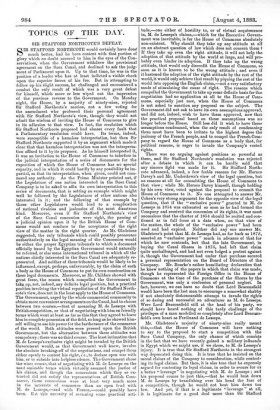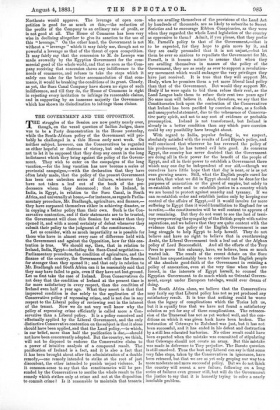TOPICS OF THE DAY.
SIR STAFFORD NORTHCOTE'S DEFEAT.
SLR STAFFORD NORTHCOTE would certainly have done much better, had he been content with that portion of glory which no doubt accrued to him in the eyes of the Con- servatives, when the Government withdrew the provisional agreement on the Suez Canal, and declined to ask the judg- ment of Parliament upon it. Up to that time, he was in the position of a leader who has at least inflicted a visible check upon the superior forces of his foe. But in attempting to follow up his slight success, he challenged and encountered a combat the only result of which was a very great defeat for himself, which more or less wiped out the impression of the previous reverse to the Government. On Monday night, the House, by a majority of ninety-nine, rejected Sir Stafford Northcote's motion, not a few voting for the amendment who professed their personal agreement with Sir Stafford Northcote's view, though they would not admit the wisdom of inviting the House of Commons to give in its adhesion to that view. In fact, the resolution which Sir Stafford Northcote proposed had almost every fault that a Parliamentary resolution could have. Its terms, indeed, were susceptible of a harmless interpretation, but then Sir Stafford Northcote supported it by an argument which made it clear that that harmless interpretation was not the interpreta- tion affixed to it by its proposer. As he himself interpreted it, it was an invitation to the House of Commons to interfere in the judicial interpretation of a series of documents for the exposition of which the House of Commons has no special capacity, and in which it could hardly by any possibility be im- partial, so that its interpretation, when given, could not com- mand any authority. As the Prime Minister pointed out, if the Legislature of one nation interested in the Suez Canal Company is to be asked to affix its own interpretation to this series of documents, that is setting an example which might well be followed by the Legislatures of other nations also interested in it ; and the following of that example by those other Legislatures would lead to a complication of national rivalries and jealousies of the most disastrous kind. Moreover, even if Sir Stafford Northcote's view of the Suez Canal concession were right, the passing of a judicial opinion upon it by the British House of Com- mons would not conduce to the acceptance of the right view of the matter in the right quarter. As Mr. Gladstone suggested, the only tribunals which could possibly pronounce authoritatively on the legal meaning of the Concession would be either the proper Egyptian tribunals to which a document officially issued by the Egyptian Government would naturally be referred, or else some international tribunal in which all the nations chiefly interested in the Suez Canal are adequately re- presented. And neither of these tribunals would be likely to be influenced, except, perhaps, unfavourably, by the claim of such a body as the House of Commons to put its own construction on these legal documents. Moreover, as Mr. Childers showed with great force, the reason which compelled the Government to takalip, not, indeed, any definite legal position, but a practical position involving the virtual repudiation of Sir Stafford North- cote's view, does not in the least apply to the House of Commons. The Government, urged by the whole commercial community to obtain more convenient arrangements on the Canal, had to choose between two courses,—that of menacing M. de Lesseps with British competition, or that of negotiating with him on friendly
terms which went at least as far as this that they agreed to leave him in complete possession of the field, so long as he showed him- self willing to use his power for the furtherance of the commerce of the world. Both attitudes were pressed upon the British Government, but the alternative between these attitudes was compulsory ; there was no third course. The least intimation that
M. de Lesseps's exclusive right might be invaded by the British Government would, as that Government well knew, involve the absolute breaking-off of the negotiations, and compel them either openly to contest his right, i.e., to declare open war with him, or to subside into helpless silence. The Government chose the wiser comse, that of negotiating with M. de Lesseps on the most amicable terms which virtually assumed the justice of his claims, and though the concessions which they so ex- tracted did not satisfy the representatives of British Com- merce, those concessions were at least very much more in the interests of commerce than an open feud with M. de Lesseps,—and with France,—could possibly have bean. Bat this necessity of assuming some practical atti-
tude,—one either of hostility to, or of virtual acquiescence in, M. de Lesseps's claims,—which for the Executive Govern- ment was inevitable, is for the House of Commons absolutely non-existent. Why should they take up any attitude at all on an abstract question of law which does not concern them I If they take up even the right attitude, it will not help the adoption of that attitude by the world at large, and will pro- bably even hinder its adoption. If they take up the wrong attitude, that would only discredit the House of Commons, so soon as it is known to be the wrong attitude ; and even if it hastened the adoption of the right attitude by the rest of the world, it would only achieve that result by piquing the rest of the world into opposing the English claim,—not a very satisfactory mode of stimulating the cause of right. The reasons which compelled the Government to take up some definite basis for the negotiation had no application at all to the House of Com- mons, especially just now, when the House of Commons is not asked to sanction any proposal on the subject. The Government did not ask to have its own assumptions approved, and did not, indeed, wish to have them approved, now that the practical proposal based on those assumptions was no longer before the House. Still less did it wish to have those assumptions condemned, when the only result of condemning them must have been to irritate to the highest degree the jealousy of the French people, and to compel the French Com- pany to regard the House of Commons as a body that, for political reasons, is eager to invade the Company's vested rights.
There was no argaing against positions so powerful as these, and Sir Stafford Northcote's resolution was rejected after a debate in which it can be hardly said that
any sincere fight was made for it. Sir Stafford North- cote advanced, indeed, a few feeble reasons for Mr. Horace Davey's and Mr. Underdown's view of the legal question, but no reasons at all for committing the House of Commons to that view ; while Mr. Horace Davey himself, though holding by his own view, voted against the proposal to commit the House of Commons to it. No one attempted to answer Mr. Cohen's very strong argument for the opposite view of the legal question, that if the " exclusive power " granted to M. de Lesseps in 1854 was exhausted so soon as he had formed the Company and received the concession of its rights, it was most anomalous that the charter of 1854 should be recited and con- firmed as in full force at a date when, on that view of the matter, the whole of the " exclusive power " had been used and had expired. Neither did any one answer Mr. Gladstone's point that M. de Lesseps had, as far back as 1872, asserted an "exclusive power" much in advance of that for which he now contends, but that the late Government, in buying the Canal Shares in 1876, had left that claim quite unchallenged, and had not even lodged a protest against it, though the Government had under that purchase secured a personal representation on the Board of Directors of the Company. Mr. Bourke's rather humiliating declaration that he knew nothing of the papers in which that claim was made, though he represented the Foreign Office in the House of Commons at the time of the purchase of the Shares by the Government, was only a confession of personal neglect. In fact, however, we can have no doubt that Lord Beaconsfield would have been the last man to encourage a somewhat shabby if not absolutely dishonourable attempt to invade the rights of so daring and successful an adventurer as M. de Lesseps. Were Lord Beaconsfield still at the head of his party, we should have heard nothing of this tardy challenge of the privileges of a man modelled so completely after Lord Beacons- field's own heart as Ferdinand de Lesseps.
Mr. Gladstone's majority of ninety-nine really meant this,—that the House of Commons will have nothing to say to the proposal to start a competition with the Suez Canal Company, the only chance of which consists in the fact that we have recently gained a military influence in Egypt which we might use, if we chose, to M. de Lesseps's injury. It is true that Sir Stafford Northcote in the strongest way deprecated doing this. It is true that he insisted on the moral claims of the Company to consideration, while contest- ing its legal claims. But then, it is also true that he expressly argued for contesting its legal claims, in order to secure for us a better " leverage" in negotiating with M. de Lesseps ; and his proposal comes to just this,—that he would beat down M. de Lesseps by brandishing over his head the fear of a competition, though he would not beat him down too low. And yet, if that is a legitimate " leverage " at all, it is legitimate for a good deal more than Sir Stafford Northcote would approve. The leverage of open com- petition is good for as much as this,—the reduction of the profits of the Company to an ordinary rate of profit, or is not good at all. The House of Commons has been very wise in declining altogether to give its sanction to the use of this "leverage." On the other hand, the Government is not without a " leverage " which it may fairly use, though not so powerful a leverage as that of the threat of open competition. It may fairly say that the concession to M. de Lesseps was made avowedly by the Egyptian Government for the com- mercial good of the whole world, and that so soon as the Com- pany receiving that concession shows any indifference to the needs of commerce, and refuses to take the steps which it safely can take for the better accommodation of that com- merce, it would be breaking the conditions of its grant. Clearly, as yet, the Suez Canal Company have shown no signs of such indifference, and till they do, the House of Commons is right in rejecting every invitation to infringe its reasonable claims, and in supporting by an immense majority the Government vshich has shown its disinclination to infringe those claims.



































 Previous page
Previous page